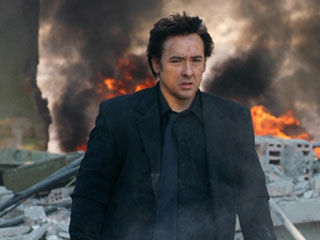War, Inc.
by George Sax
Give War a Chance
Earlier this week, on the same day I received a review copy of War, Inc. from FedEx, the New York Times carried a front-page article on the losing struggle of a Pentagon contract executive to hold Iraq war contractor KBR to account for its expense statements. KBR was until last year a subsidiary of Halliburton, the oil industry conglomerate whose chief executive in the 1990s was US Vice President Dick Cheney.

This ought to be literally good news for the movie’s producers—who include its star and co-writer John Cusack—because War, Inc. relies on Cheney’s much remarked-on relationship to Halliburton to an important extent. Although it’s unlikely to help the movie’s commercial or critical prospects. It’s too late for that. Cusack is reported to have labored long, hard, and against the odds to get this movie made, but the market outlook never provided much ground for hope. Americans have been avoiding releases dealing with the Iraq war and related topics with impressive consistency.
Cusack and company had an important additional liability. They set out to lampoon America’s imperial foreign policy and international commercial reach, and this was bound to be a hard sell. Satire, as theater folk were famously told eons ago, is what closes on Saturday night. There might be some compensatory satisfaction for the filmmakers and the more discerning filmgoers if War, Inc. was a succèss d’estime, but it is no unjustly ignored gem. Its energy considerably exceeds its achievement.
Its underlying takeoff concept is a 21st century where states don’t just outsource wartime support services to megalithic capitalism, they contract for the wars themselves, to the Tamerlane Corporation, for instance. It’s headed by a former US vice president (Dan Aykroyd), whom we first encounter sitting on a toilet while having a phone conversation with Hauser (Cusack), a company assassin. We’ve already encountered Hauser in a spaghetti Western-esque opening, plying his trade in a Canadian Northwest Territory bar.
Now the former veep is sending him to the Tamerlane-occupied capital of the Central Asian nation of Turaqistan. Once there he’s to pose as the manager of an international trade show, and to off the head of state of another of the region’s “Stans.” (He’s named Omar Sharif!)
Watch the trailer for "War Inc.""
Why this is desirable isn’t quite clear. It may have something to do with an energy pipeline, but this movie hardly lingers on explanations. War, Inc. isn’t so much scattershot as methodically muddled. It moves along at a hyper, hellzapoppin’ pace, throwing off gags with tireless industry and apparent confidence. But for a work with satirical aspirations, its scoring average, not to mention its tonal cohesion, isn’t nearly good enough. The director (Joshua Seftel) and the writers seem to have believed in the efficacy of taking some real-world institution or phenomenon and paradically stretching it. Thus, Baghdad’s notoriously isolated home of the American command, the Green Zone, becomes the Emerald City.
Here and there, there’s a target hit. (The movie’s version of too-docile embedded reporters is “implanted” reporters, who vicariously experience the war with tiny inserted electronic receivers, sitting in virtual reality theaters.)
But not often enough. And War, Inc. never develops the necessary created context in which its intended tone of scathing cheekiness can work. Rather than coming off as a penetratingly comic recreation of reality, it seems to be spinning allusions to popular culture.
In a slambang finale involving Ben Kingsley, there’s some noticeable borrowing from Stanley Kubrick’s classic, Dr. Strangelove. Kingsley, as Hauser’s crazed, deadly enemy, comes off better than his material, but Marisa Tomei, playing a cynical liberal journalist, sometimes seems unsure of how to proceed.
The quasi-Python-esque hurlyburly becomes tiring and at one point, after a reference to tempeh, I reached for a dictionary to find out how it’s made. Satire shouldn’t send one to reference works for distraction.
blog comments powered by Disqus
|
Issue Navigation> Issue Index > v7n25: Who's Sorry Now (6/19/08) > Film Reviews > War, Inc. This Week's Issue • Artvoice Daily • Artvoice TV • Events Calendar • Classifieds |









 Current Issue
Current Issue